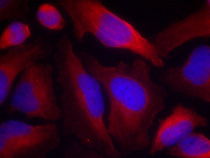ARG51801
anti-Tyrosine Hydroxylase phospho (Ser19) antibody
anti-Tyrosine Hydroxylase phospho (Ser19) antibody for ICC/IF and Rat
Cancer antibody; Metabolism antibody; Neuroscience antibody
Overview
| Product Description | Rabbit Polyclonal antibody recognizes Tyrosine Hydroxylase phospho (Ser19) |
|---|---|
| Tested Reactivity | Rat |
| Tested Application | ICC/IF |
| Host | Rabbit |
| Clonality | Polyclonal |
| Isotype | IgG |
| Target Name | Tyrosine Hydroxylase |
| Antigen Species | Rat |
| Immunogen | Peptide sequence around phosphorylation site of serine19 (A-V-S(p)-E-Q) derived from Rat Tyrosine Hydroxylase (TH). |
| Conjugation | Un-conjugated |
| Alternate Names | DYT14; TYH; Tyrosine 3-monooxygenase; Tyrosine 3-hydroxylase; TH; DYT5b; EC 1.14.16.2 |
Application Instructions
| Application Suggestion |
|
||||
|---|---|---|---|---|---|
| Application Note | * The dilutions indicate recommended starting dilutions and the optimal dilutions or concentrations should be determined by the scientist. |
Properties
| Form | Liquid |
|---|---|
| Purification | Antibodies were produced by immunizing rabbits with KLH-conjugated synthetic phosphopeptide. Antibodies were purified by affinity-chromatography using epitope-specific phosphopeptide. In addition, non-phospho specific antibodies were removed by chromatogramphy using non-phosphopeptide. |
| Buffer | PBS (without Mg2+ and Ca2+, pH 7.4), 150mM NaCl, 0.02% Sodium azide and 50% Glycerol. |
| Preservative | 0.02% Sodium azide |
| Stabilizer | 50% Glycerol |
| Concentration | 1 mg/ml |
| Storage Instruction | For continuous use, store undiluted antibody at 2-8°C for up to a week. For long-term storage, aliquot and store at -20°C. Storage in frost free freezers is not recommended. Avoid repeated freeze/thaw cycles. Suggest spin the vial prior to opening. The antibody solution should be gently mixed before use. |
| Note | For laboratory research only, not for drug, diagnostic or other use. |
Bioinformation
| Database Links | |
|---|---|
| Gene Symbol | Th |
| Gene Full Name | tyrosine hydroxylase |
| Background | The protein encoded by Tyrosine Hydroxylase is involved in the conversion of tyrosine to dopamine. It is the rate-limiting enzyme in the synthesis of catecholamines, hence plays a key role in the physiology of adrenergic neurons. Mutations in this gene have been associated with autosomal recessive Segawa syndrome. Alternatively spliced transcript variants encoding different isoforms have been noted for this gene. |
| Function | Plays an important role in the physiology of adrenergic neurons. [UniProt] |
| Highlight | Related products: Tyrosine Hydroxylase antibodies; Tyrosine Hydroxylase Duos / Panels; Anti-Rabbit IgG secondary antibodies; Related news: Astrocyte-to-neuron conversion for Parkinson's disease treatment |
| Research Area | Cancer antibody; Metabolism antibody; Neuroscience antibody |
| Calculated MW | 59 kDa |
Images (1) Click the Picture to Zoom In






